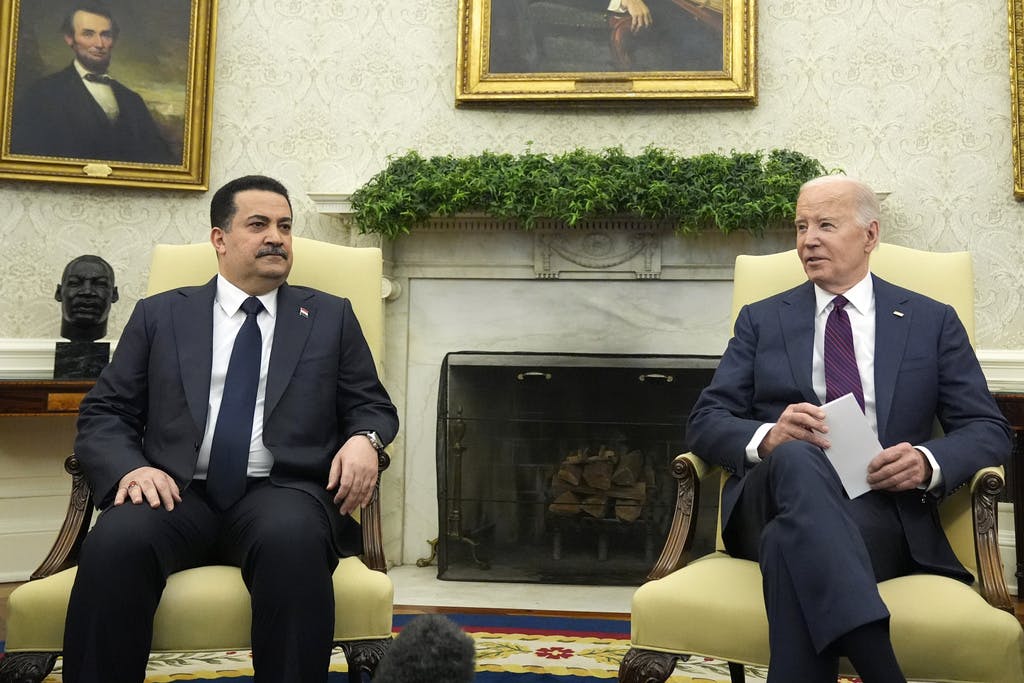Biden Hosting Leader of Tehran Ally Even as Washington Urges a Softer Response by Irael to the Attack From Iran
The Islamic Republic is eager to complete its domination of Iraq and is pressuring Baghdad to sever agreements that facilitate the presence there of 2,500 American GIs.

As Washington urges Israel to soften its response to Sunday morning’s unprecedented Iranian attack, and instead work to ratchet up global pressures on Tehran, President Biden is hosting a leader of the Islamic Republic-allied Iraq, Prime Minister Shia al-Sudani.
The government at Baghdad is dominated by pro-Iranian parties, and it includes politicians who represent militias that often attack American bases in Iraq and Syria. Armed and trained by Iran’s Islamic Revolutionary Guards Corps, those militias have also joined Lebanon’s Hezbollah and the Houthis in attacking Israel with drones and missiles.
Mr. al-Sudani “is the friendly face of the pro-Iran Islamists and proxy forces vis-à-vis the United States and the region,” a former American ambassador to Iraq, Zalmai Khalilzad, writes. “But it’s important to remember that he is not in charge. At most, he can convey messages from those in charge and act as a mediator.”
The Islamic Republic is eager to complete its domination of Iraq and is pressuring Baghdad to sever agreements that facilitate the presence there of 2,500 American GIs. “We are working to move from a military relationship to a full partnership with the United States,” Mr. al-Sudani said Monday.
Behind the scenes, Mr. Biden is “likely” to indicate to his guest that America is willing to consider troop withdrawal from Iraq, Mr. Khalilzad told the Sun prior to the Monday meeting. Such a retreat could make it easier for the Islamic Republic to completely take over Iraq, complicating American and Israeli efforts to intercept Iranian arms deliveries to Syria and Lebanon.
It would also put Iran on Jordan’s border. The Hashemite kingdom is concerned about Iranian attempts to overthrow King Abdullah II, dominate Jordan, and add it to the “ring of fire” of hostile Israeli neighbors. That fear was the main reason Jordan openly participated in a coalition that helped Israel fend off more than 300 missiles and drones that Iran launched at the Jewish state.
Mr. Biden is urging Israel to forgo a major response, in order that he can further strengthen the coalition and coordinate renewed diplomatic and economic pressures on Iran. America “is committed to Israel’s security” and is “also committed to the security of our personnel and partners in the region, including Iraq,” the president said Monday, as he greeted Mr. Al-Sudani at the White House.
Jerusalem’s war cabinet met for three hours Monday to decide on a reaction to the Iranian attack. According to several Israeli press reports, two of its members, opposition leaders Benny Gantz and Gadi Eisenkot, urged on Sunday an immediate, painful hit on Iranian targets.
Following a phone conversation with Mr. Biden, however, Prime Minister Netanyahu canceled a pre-planned Israel Defense Force counterattack. “There were specific warnings that the planned operation would harm U.S. forces in the region,” a political analyst on Channel 12 News, Amit Segal, reports.
“We don’t seek escalation, but we’ll continue to support the defense of Israel and to protect our personnel in the region,” Secretary Blinken said Monday as he entered a meeting with the Iraqi deputy premier, Mohammed Ali Tamim.
Washington will “explore additional measures to hold Iran accountable here at the United Nations,” the American deputy ambassador to Turtle Bay, Robert Wood, told the Security Council during an emergency meeting Sunday, in an indication that Wshington plans to increase diplomatic measures against Tehran.
Yet the IDF chief of staff, Lieutenant General Herzi Halevi, said Monday during a visit to the Nevatim air force base, which was slightly damaged by Iranian ballistic missiles, that “the Iranian attack will be met with response.” He declined to specify the scope or timing of a possible military attack.
The Israeli defense minister, Yoav Gallant, told Secretary Austin on Monday that an attack is coming, and American officials likely understand that Israel cannot let the Iranian assault go unanswered.
Jerusalem is weighing strikes against major Iranian military installations, including those related to the drone and missile industries. It could bomb oil fields that are Iran’s major economic lifeline, kill top IRGC officers responsible for the attack, or launch cyberattacks. Striking the nuclear installation without American support is less likely at this point.
Some Israelis urge the IDF, instead, to deal major blows to proxies, such as the Houthis in Yemen. “My view: a strong blow on Hezbollah, not on Iran. Now,” a veteran Mideast watcher at Haifa University, Amatzia Bar’am, tells the Sun.
Israel is weighing the pros and cons of a military hit versus America’s promise for renewed, global sanctions on an isolated Iran. Yet, moves like a White House reception for the Iraqi prime minister — or granting an entry visa for Iran’s foreign minister, who will be at New York later this week — signal the limitations of Mr. Biden’s diplomatic promises.

